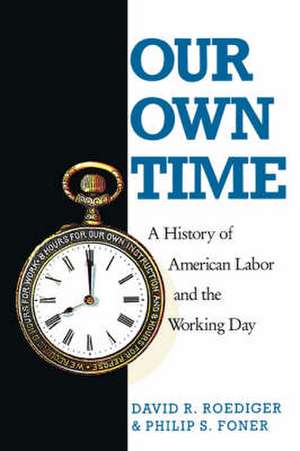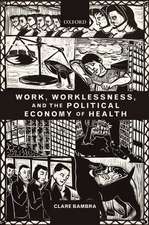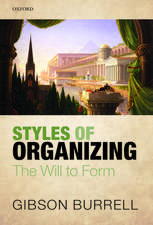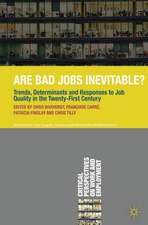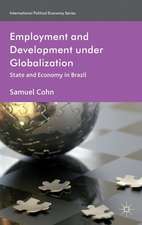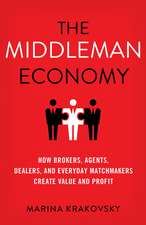Our Own Time: A History of American Labor and the Working Day: Haymarket
Autor Philip S. Foner, David R. Roedigeren Limba Engleză Paperback – 31 ian 1997
| Toate formatele și edițiile | Preț | Express |
|---|---|---|
| Paperback (1) | 241.36 lei 22-36 zile | |
| VERSO – 31 ian 1997 | 241.36 lei 22-36 zile | |
| Hardback (1) | 441.71 lei 43-57 zile | |
| Greenwood Press – 28 feb 1989 | 441.71 lei 43-57 zile |
Din seria Haymarket
-
 Preț: 150.97 lei
Preț: 150.97 lei -
 Preț: 143.16 lei
Preț: 143.16 lei -
 Preț: 138.83 lei
Preț: 138.83 lei -
 Preț: 172.18 lei
Preț: 172.18 lei -
 Preț: 154.68 lei
Preț: 154.68 lei -
 Preț: 240.49 lei
Preț: 240.49 lei -
 Preț: 215.45 lei
Preț: 215.45 lei -
 Preț: 146.46 lei
Preț: 146.46 lei -
 Preț: 176.27 lei
Preț: 176.27 lei -
 Preț: 176.51 lei
Preț: 176.51 lei -
 Preț: 143.98 lei
Preț: 143.98 lei -
 Preț: 170.51 lei
Preț: 170.51 lei -
 Preț: 215.70 lei
Preț: 215.70 lei -
 Preț: 211.51 lei
Preț: 211.51 lei -
 Preț: 148.10 lei
Preț: 148.10 lei -
 Preț: 171.14 lei
Preț: 171.14 lei -
 Preț: 367.70 lei
Preț: 367.70 lei -
 Preț: 184.71 lei
Preț: 184.71 lei -
 Preț: 177.17 lei
Preț: 177.17 lei -
 Preț: 162.09 lei
Preț: 162.09 lei
Preț: 241.36 lei
Nou
Puncte Express: 362
Preț estimativ în valută:
46.18€ • 48.34$ • 38.44£
46.18€ • 48.34$ • 38.44£
Carte disponibilă
Livrare economică 10-24 martie
Preluare comenzi: 021 569.72.76
Specificații
ISBN-13: 9780860919636
ISBN-10: 0860919633
Pagini: 380
Dimensiuni: 152 x 229 x 23 mm
Greutate: 0.53 kg
Ediția:Revised
Editura: VERSO
Seriile Haymarket, Haymarket (Paperback)
Locul publicării:United Kingdom
ISBN-10: 0860919633
Pagini: 380
Dimensiuni: 152 x 229 x 23 mm
Greutate: 0.53 kg
Ediția:Revised
Editura: VERSO
Seriile Haymarket, Haymarket (Paperback)
Locul publicării:United Kingdom
Recenzii
“This definitive study of the working day shows how workers defined the reality of their lives and reshaped our concept of time.”—George P. Rawick
“This groundbreaking book ... is crucial reading not only for labor historians but for all those who have ever punched a clock.”—Elizabeth McKillen, International Labor and Working Class History
“Roediger and Foner show us once again that people want to work to live, not live to work.”—James Green
“Shows that shorter hours captured the imagination and aspirations of the worker not only in his or her role as worker but also as citizen, consumer, leisure-seeker and family member.”—Rose Feurer, Labor Studies Journal
“This groundbreaking book ... is crucial reading not only for labor historians but for all those who have ever punched a clock.”—Elizabeth McKillen, International Labor and Working Class History
“Roediger and Foner show us once again that people want to work to live, not live to work.”—James Green
“Shows that shorter hours captured the imagination and aspirations of the worker not only in his or her role as worker but also as citizen, consumer, leisure-seeker and family member.”—Rose Feurer, Labor Studies Journal
Notă biografică
Philip S. Foner (1910–1994) was Professor Emeritus of History at Lincoln University, Pennsylvania. He was the author of more than 110 published works, including History of the Labor Movement, Organized Labor and the Black Worker, Women in the American Labor Movement and American Labor Songs of the Nineteenth Century.
David Roediger is Kendrick Babcock Chair of History at the University of Illinois. Among his books are Our Own Time: A History of American Labor and the Working Day (with Philip S. Foner), How Race Survived US History: From Settlement and Slavery to the Obama Phenomenon, and The Wages of Whiteness: Race and the Making of the American Working Class. He is the editor of Fellow Worker: The Life of Fred Thompson, The North and Slavery and Black on White: Black Writers on What It Means to Be White as well as a new edition of Covington Hall’s Labor Struggles in the Deep South. His articles have appeared in New Left Review, Against the Current, Radical History Review, History Workshop Journal, The Progressive and Tennis.
David Roediger is Kendrick Babcock Chair of History at the University of Illinois. Among his books are Our Own Time: A History of American Labor and the Working Day (with Philip S. Foner), How Race Survived US History: From Settlement and Slavery to the Obama Phenomenon, and The Wages of Whiteness: Race and the Making of the American Working Class. He is the editor of Fellow Worker: The Life of Fred Thompson, The North and Slavery and Black on White: Black Writers on What It Means to Be White as well as a new edition of Covington Hall’s Labor Struggles in the Deep South. His articles have appeared in New Left Review, Against the Current, Radical History Review, History Workshop Journal, The Progressive and Tennis.
Descriere
Descriere de la o altă ediție sau format:
Our Own Time provides the first full account of the movement to shorten the working day in the United States. Combining the narrative and trade union emphasis of traditional labor history with the focus on culture and the labor process characteristic of contemporary labor history, the book offers an illuminating reinterpretation of the history of the U.S. labor movement from the colonial period onward. The authors argue that the length of the working day or week historically has been the central issue raised by the American labor movement during its most vigorous periods of organization.
Beginning with a picture of working hours in colonial America and the early republic, Roediger and Foner then analyze the ideology of the movement for a ten-hour workday in the early nineteenth century. They demonstrate that the ten-hour issue was a key to the dynamism of the Jacksonian labor movement as well as to the unity of male artisans and female factory workers in the 1840s. The authors proceed to examine the subsequent demands for an eight-hour day, which helped to produce the mass labor struggles of the late nineteenth century and established the American Federation of Labor as the dominant force in American trade unionism. Chapters on labor movement defeats following World War I, on the depression years, and on the lack of progress over the last half-century complete the study. Our Own Time will be an ideal supplemental text for courses in U.S. labor and economic history.
Our Own Time provides the first full account of the movement to shorten the working day in the United States. Combining the narrative and trade union emphasis of traditional labor history with the focus on culture and the labor process characteristic of contemporary labor history, the book offers an illuminating reinterpretation of the history of the U.S. labor movement from the colonial period onward. The authors argue that the length of the working day or week historically has been the central issue raised by the American labor movement during its most vigorous periods of organization.
Beginning with a picture of working hours in colonial America and the early republic, Roediger and Foner then analyze the ideology of the movement for a ten-hour workday in the early nineteenth century. They demonstrate that the ten-hour issue was a key to the dynamism of the Jacksonian labor movement as well as to the unity of male artisans and female factory workers in the 1840s. The authors proceed to examine the subsequent demands for an eight-hour day, which helped to produce the mass labor struggles of the late nineteenth century and established the American Federation of Labor as the dominant force in American trade unionism. Chapters on labor movement defeats following World War I, on the depression years, and on the lack of progress over the last half-century complete the study. Our Own Time will be an ideal supplemental text for courses in U.S. labor and economic history.
